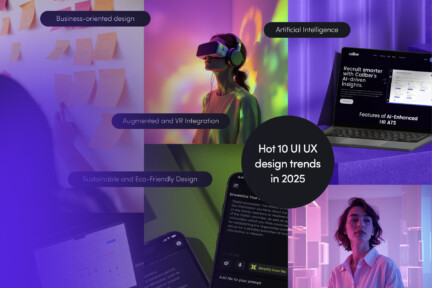The music industry has seen tremendous changes over the past year due to technological advancements. Businesses can’t play it by ear anymore – strategic changes are a must to stay afloat. AI is changing the way music is produced and promoted, and in the digital crowd, it seems harder than ever to strike a chord among listeners.
To navigate these changes, we gathered industry leaders and experts in one virtual room once again. The Innovation Waves event hosted by Jerzy Biernacki, Chief AI Officer at Miquido, brought together panelists with extensive industry backgrounds to discuss music innovation’s current landscape and future directions.
The expert trio included Sania Haq, AI practitioner and cultural consultant with expertise in the South Asian music industry, Hazel Savage, former CEO and Co-Founder of Musiio, and an early employee at Shazam, and Jane Dyball, former CEO of the Music Publishers Association, mentor, and strategic consultant.
Our guests were far from singing off the same sheet – in a diverse discussion, they presented their points of view on AI’s role in the evolution of the music industry, the cultural and ethical considerations of this transformation, and its main opportunities. Here are six key takeaways from the panel discussion.
Opportunities with AI in Music
Despite the romanticized stereotypes, working on music is not all creativity. There are various tedious tasks that AI can leverage, giving creatives more space to pursue their crucial goals. Hazel Savage shared how AI can automate the process of tagging music, identifying moods and genres, and even separating individual instruments within a track. This automation can lead to better data management, more accurate usage tracking, and quicker processing.
She is on her own ground with this statement, having worked with automation in this field. Musiio, developed by Savage’s company, can analyze a song to determine its genre, mood, BPM, and key. This detailed tagging process, previously done manually, can now be accomplished swiftly and accurately by AI. This saves time and reduces human error, ensuring that the metadata associated with each track is precise. That means a higher chance that the music reaches the right ears.
And it’s not where the list of benefits ends. AI’s ability to separate stems from a track means that producers and remix artists can easily access individual components of a song, fostering creativity and new interpretations of existing music.
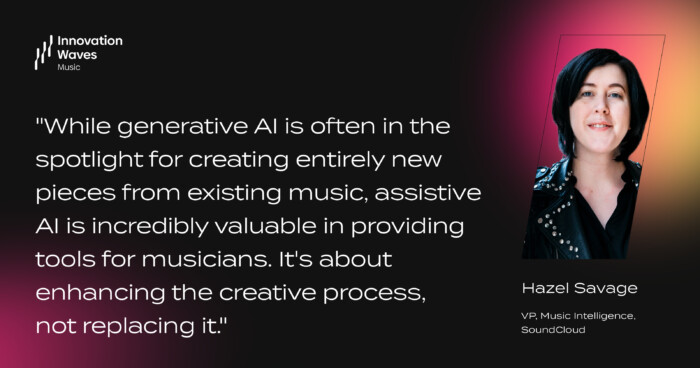
Examples of AI and Generative AI in Music Creation:
- AI-Driven Mastering: Services like LANDR offer affordable, high-quality mastering using AI, making professional production accessible to independent artists.
- Source Separation: AudioShake can separate stems (vocals, instruments) from tracks, allowing creative remixes and re-dubbing for different markets.
- Live Production Revolutionized: Technologies like Set Mixer use AI to mix live concert outputs, providing production-ready assets immediately after a show.
Investment Trends in Music Tech Startups
Investors are starting to see the potential of AI in the music industry. Despite the cyclic nature of investment in music tech startups, a strong appetite for AI innovation, particularly for proprietary AI models, is visible. And it grows with eating! However, startups must ensure they have a solid business case and legal use cases for their technology to attract and sustain investment.
The initial skepticism towards AI in the music industry will turn into an eventual acceptance, according to Hazel Savage. When she started her company in 2018, few saw the potential of AI, but now it has become a hot topic. Investors are particularly interested in startups that leverage AI to create innovative solutions, such as automated music tagging, music recommendation systems, and AI-driven music production tools.
Nevertheless, music startups must navigate the complex landscape of legal and ethical use cases to ensure their technology can be legally and effectively integrated into the industry. The essential aspects? Ensuring the training data is legally obtained and AI models comply with copyright laws.
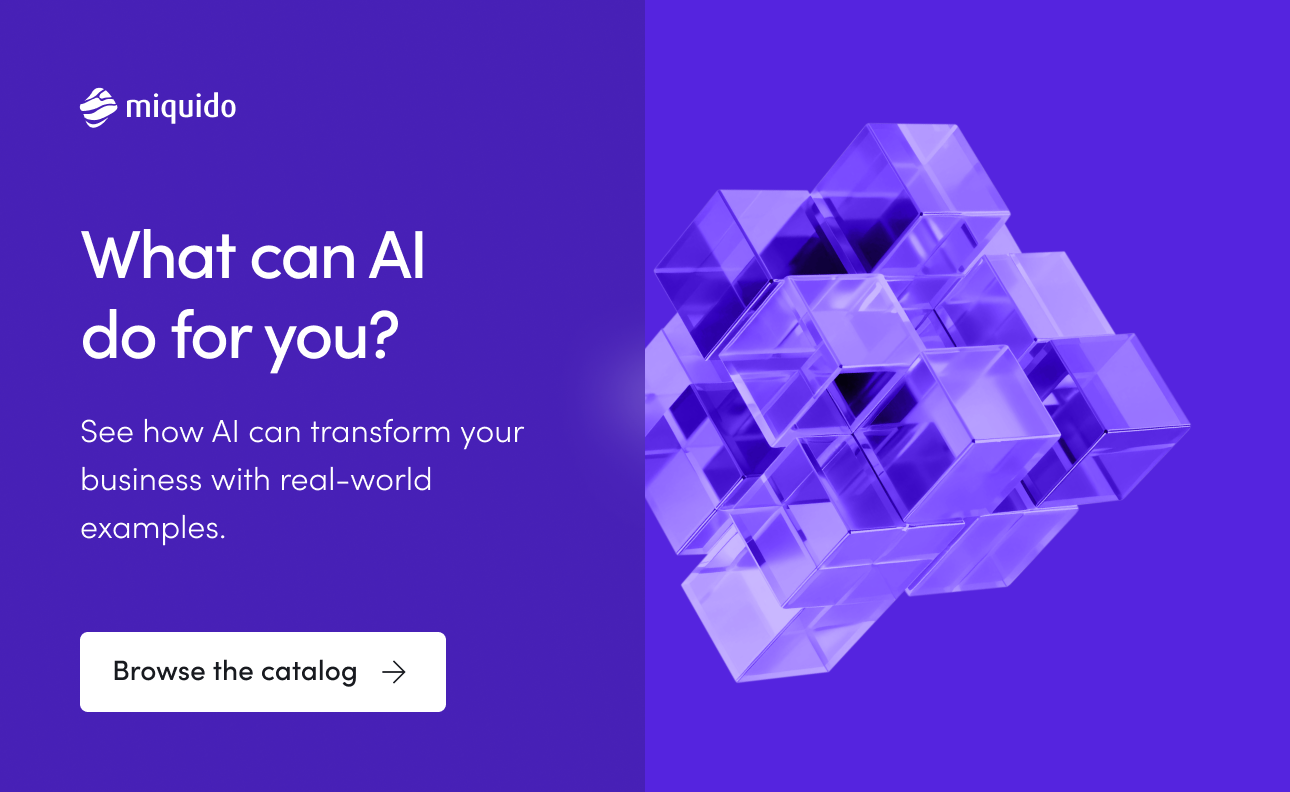
Key Considerations for Startups:
- Legal Compliance: Ensuring AI models are trained on legally obtained data.
- Business Case: Demonstrating clear use cases and benefits to attract investment.
- Ethical Use: Adhering to ethical standards to build trust and sustainability.
Consumer Perception of AI in Music Production
Yes – AI models are getting better and better at performing creative tasks. But there’s a catch – according to studies, consumers notably prefer human creativity and value human involvement in music production. That could mean AI-generated music may resist widespread acceptance.
Thus, understanding consumer sentiment is crucial for music startups and artists thinking of AI automation, as emphasized by Sania Haq. While AI can assist in music creation, listeners still crave the human element. This preference is evident in the success of live performances and the personal connections fans feel with their favourite artists.
While AI can enhance music production by providing tools for mixing, mastering, and even composing, the human touch in creating music remains irreplaceable. Music entrepreneurs should aim for a balanced approach, where AI supports but does not overshadow human creativity, ensuring that music creation’s emotional and personal elements are preserved.
However, as Hazel Savage points out, the approach to music and artists is evolving in front of our eyes. With GenZ and Alpha becoming dominant consumer groups, music companies and creators will be able to go all in terms of AI-driven innovation. It will be less about the songs themselves and more about the opportunities they create. Generative AI in music creation may blossom on this perfect ground!
Insights on Consumer Preferences:
- Emotional Connection: The importance of the human touch in creating emotionally resonant music.
- Live Performances: The continued value of live, human-performed music experiences.
- Balancing AI and Human Creativity: Using AI to enhance, not replace, the human element in music.
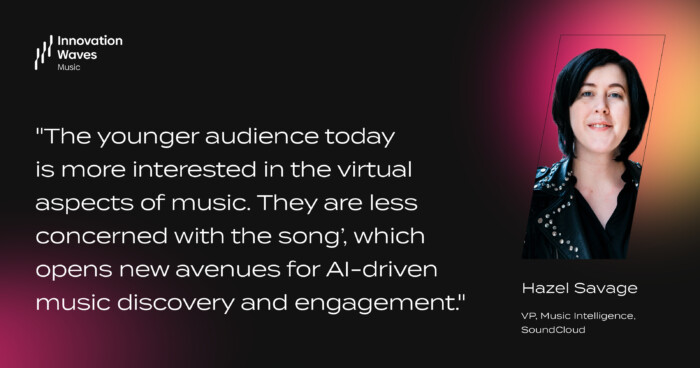
Future Trends and Collaborations in the Music Industry
DJ-created mashups and cross-genre collaborations attract listeners and can be a significant factor in driving popularity. However, it is the authentic collaborations between artists that are the most valued among consumers. Take Stormzy and AP Dhillon or Sia and Diljit Dosanjh, the team-ups brought up by Sania Haq – they sparked real excitement and interest in the consumer group.
Without a doubt, these collaborations resonate more with audiences than AI-generated mashups. We, as listeners, want to see genuine connections form in front of us and experience the results of these exchanges. For instance – when artists from different cultural backgrounds get together, they can introduce new sounds and expand the reach of their music. That is something AI cannot give us.
The takeaway: in order to maintain consumer trust and engagement, the industry should focus on ensuring collaborations’ authenticity and distinguishing them from AI-generated content. It’s not about excluding one or the other but taking the best of two worlds: promoting real artist collaborations while using AI to facilitate and enhance these partnerships rather than replace them.
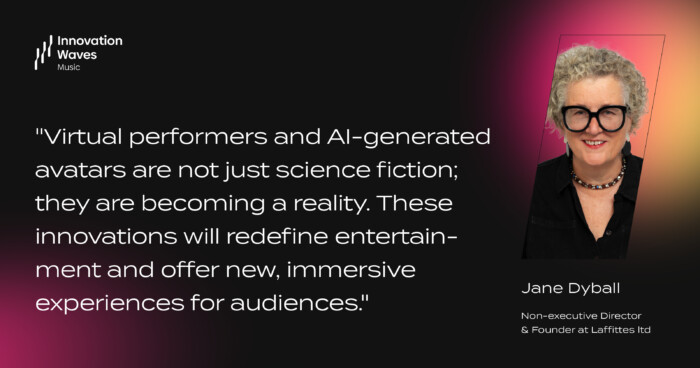
Ethical Considerations and Data Security in AI Development
In the music industry, AI usage can be particularly complicated due to ethical considerations, particularly in data privacy and security. Any music development company must adhere to regulations like GDPR and ensure that any use of copyrighted material is appropriately licensed.
Fortunately, there are tools for that! Hazel Savage shared her experience with Rolls Royce’s open-source AI framework, which helps organizations consider AI’s ethical, societal, and financial implications. It can guide music tech startups in developing responsible AI technologies that respect data privacy and security standards.
Integrating such ethical considerations is a key to building trust and ensuring sustainable growth in the AI-driven music industry. For instance, AI models should be trained on legally obtained data, and companies should be transparent about consumer data use. On top of that, robust data security measures can protect against breaches and ensure user data is handled responsibly.
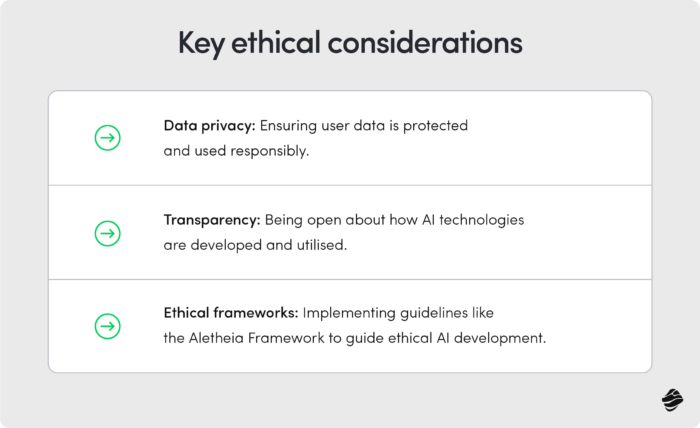
Key Ethical Considerations:
- Data Privacy: Ensuring user data is protected and used responsibly.
- Transparency: Being open about how AI technologies are developed and utilised.
- Ethical Frameworks: Implementing guidelines like the Aletheia Framework to guide ethical AI development.
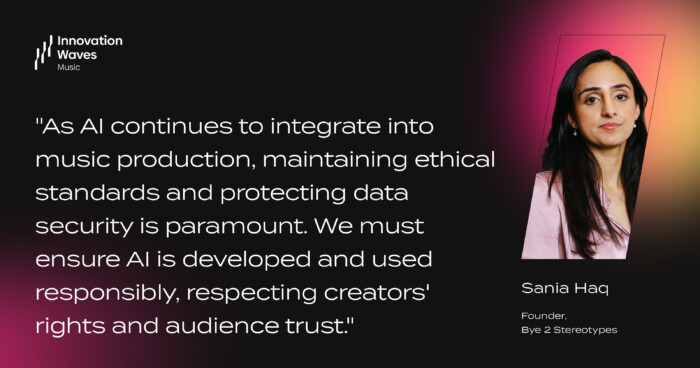
Challenges and Opportunities for Artists and Labels
Unlicensed training of AI on copyrighted works is a burning issue in the music industry. You may have heard about the recent letter demanding protection against AI, signed by Billie Eilish, Nicki Minaj, and Bon Jovi, among others. In order to protect music creators, we need appropriate legislation regarding generative AI in music production. And they are on the way! In Europe, the AI Act may define how is AI used in entertainment and other niches, but we will clearly need more industry-specific regulations.
Developing effective legal frameworks is difficult due to the complexities of copyright law and the difficulties in implementing effective regulations across different jurisdictions pointed out by Jane Dyball. She emphasised the need for clear standards and agreements to protect the rights and revenues of artists and labels. Another challenge lies in identifying AI-generated works and separating them from human-created content.
Additionally, AI can provide tools for better data accuracy and quicker processing, which can help address some of the inefficiencies in the current copyright management systems. For example, AI can streamline registering and tracking copyrights, ensuring that artists receive fair compensation for their work. However, the industry must develop methods to identify AI-generated content and ensure it does not infringe on existing copyrights, possibly through new legislation or industry standards.
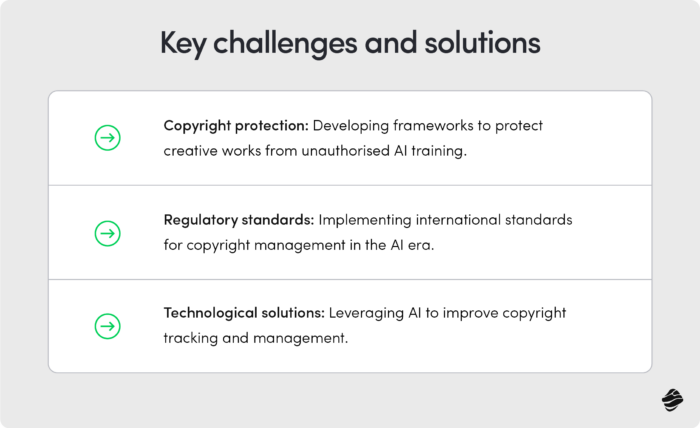
Key Challenges and Solutions:
- Copyright Protection: Developing frameworks to protect creative works from unauthorised AI training.
- Regulatory Standards: Implementing international standards for copyright management in the AI era.
- Technological Solutions: Leveraging AI to improve copyright tracking and management.
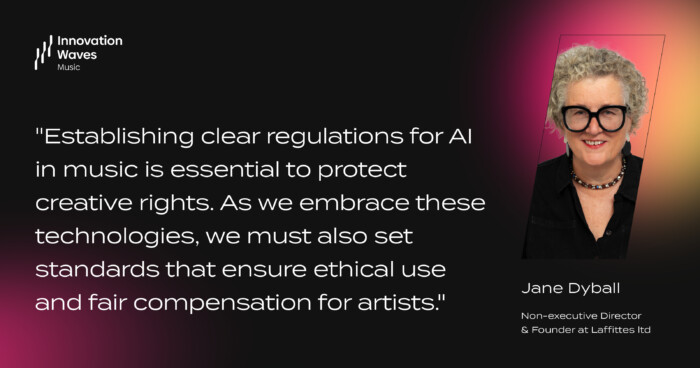
Tuning into the Future: AI’s Revolution in Music
After the initial hesitation, the music industry has changed its tune regarding AI. The spectrum of AI and generative AI use cases will continue to strengthen as younger generations interested in the virtual aspects of music will dominate the consumer market.
With numerous opportunities for innovation and efficiency, AI also brings challenges, particularly concerning copyright. Engaging in continuous dialogue, implementing robust legal frameworks, and fostering authentic collaborations can ensure that AI enhances rather than diminishes the richness of music creation.
Share your thoughts and experiences on AI shaping the music industry in the comments below! Recordings are available on-demand for those who missed the event or wish to revisit the discussions. Sign up to access the complete set of sessions and stay informed about the future of music innovation.
And if you have an idea for music innovation, we can help you hit the right note! Let’s discuss it – contact us here.




![[header] best 5 langchain alternatives for your ai projects](https://www.miquido.com/wp-content/uploads/2025/02/header-best-5-langchain-alternatives-for-your-ai-projects-432x288.jpg)

![[header] ai for production planning streamlining efficiency in manufacturing](https://www.miquido.com/wp-content/uploads/2025/01/header-ai-for-production-planning_-streamlining-efficiency-in-manufacturing-1-432x288.jpg)
